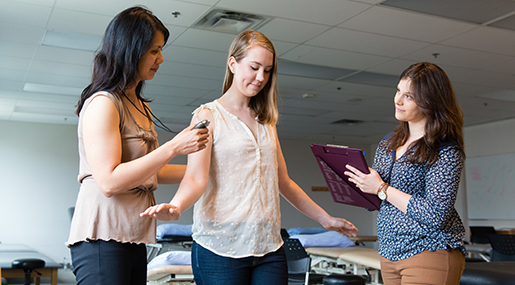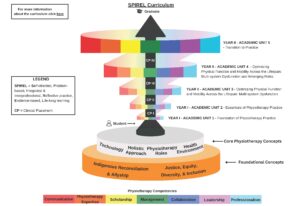Curriculum Delivery
Expandable List
- Small group learning (6-8 people)
- Learning based on real-life clinical scenarios
- Student driven learning process
- Tutor-facilitated learning
- Large and small group learning and discussion
- Faculty and clinician facilitated
- Skill development and demonstration
- Practical hands-on sessions
- Community visits
- Small group activities
- Large group discussions
- Guest lectures
- Student presentations
- Small group research opportunity in second year of study
- Faculty members or clinicians from community act as supervisors
- Opportunity to work with students, faculty or clinicians from other health care disciplines
- Clinical experience in a variety of healthcare environments supervised by regulated healthcare professionals
Term 1 (Fall)
Expandable List
6 Units
This course introduces students to the theory and processes of problem-based, small group learning, self-regulation and an evidence-based approach. This course reviews and builds on fundamental pre-requisite knowledge related to anatomy, physiology, statistics, and social sciences. This course builds foundational knowledge related to assessment, treatment and prevention of musculoskeletal, cardiorespiratory and neurological conditions.
6 Units
In this first clinical laboratory course, students will master foundational skills related to performing physiotherapy assessments and treatments safely for musculoskeletal, cardiorespiratory, neurological and other conditions across the lifespan. Relevant research evidence and theory will be used to develop clinical decision-making and physiotherapy skills.
3 Units
This first PTPRAC course introduces the student to the fundamentals of physiotherapy and foundational knowledge for the physiotherapy practitioner. Broad topics related to professionalism and professional practice, communication and collaborative practice, models of practice/frameworks and movement science will be explored.
3 Units
This first research and evidence-based practice course will address the fundamentals and foundational knowledge of evidence based practice for physiotherapy. Topics include study design, critical appraisal and outcome measures.
Term 2 (Winter)
Expandable List
3 Units
PHYSIOTH 781 consists of in-class sessions and assignments to be provided and completed within the corresponding academic unit. This course also provides the opportunity for students to apply physiotherapy assessment and management skills with clients who have a variety of conditions. The clinical settings may include the community, hospital or long-term care/rehabilitation centres.
6 Units
This course continues to develop student skills and behaviours required in problem-based, small group tutorials, using self-regulation and an evidence-based approach. This course reviews and builds on fundamental knowledge from PT*741, anatomy, physiology, statistics, biomechanics, exercise physiology, social sciences and foundational knowledge related to clinical reasoning and decision-making, assessment, treatment and prevention of musculoskeletal, cardiorespiratory and neurological conditions.
6 Units
In this second clinical laboratory course, students will apply and build on foundational knowledge mastered in PHYSIOTH 751. Students will integrate skills to safely perform physiotherapy assessments and treatments for persons with multiple health issues across the lifespan. Relevant research evidence and theory will be used to further develop clinical decision-making and physiotherapy skills.
3 units
This second PTPRAC course continues to examine the fundamentals of physiotherapy practice and foundational knowledge for the physiotherapy practitioner within the major themes of professionalism and professional practice, communication and collaborative practice, models of practice/frameworks and movement science. Topics include: ethics, working with support personnel, leadership, patient advocacy and professional and role boundaries.
1.5 units
This second course will continue to address the fundamentals and foundational knowledge of physiotherapy research and evidence based practice. Topics include study design, critical appraisal and outcome measures. This course will build on the research and evidence based practice knowledge taught in PHYSIOTH 771.
Term 3 (Spring/Summer)
Expandable List
3 Units
PHYSIOTH 782 consists of in-class sessions and assignments to be provided and completed within the corresponding academic unit and the opportunity for students to apply physiotherapy assessment and management skills with clients with a variety of conditions in a variety of clinical settings. The clinical settings may include the community, hospital or long-term care/rehabilitation centers.
Term 4 (Fall)
Expandable List
6 Units
Continuing with problem-based, small group learning, this course introduces students to the complexity of evaluating/treating individuals with multi-system dysfunction. Healthcare problems will incorporate concepts related to the interaction between individual/task/environment. Students will develop knowledge related to evidence-based assessments and preventative/restorative/compensatory interventions to optimize function for clients with acute/chronic multi-system dysfunction across the lifespan.
6 Units
In this clinical laboratory course, students will build on knowledge and skills developed in PHYSIOTH 751 and 752. Students will continue to develop the knowledge and skills evaluate and treat individuals with multi-system dysfunction across the continuum of care, and recognize their role within an interdisciplinary team. Students will become proficient in developing management plans and the application of a prevention framework.
1.5 Units
Fundamentals of physiotherapy practice and foundational knowledge for the physiotherapy practitioner continue to be explored in this third PTPRAC course, through professionalism and professional practice, communication and collaborative practice, models of practice/frameworks and movement science themes. Topics include: conflict management, community advocacy, physiotherapist as change agent, personal and professional competence, specialized documentation.
1.5 units
In this course, students will build on their knowledge from previous units with respect to evidence-based practice and knowledge translation. This course will include an in-depth understanding of knowledge synthesis with a focus on systematic reviews.
3 units
PHYSIOTH 783 consists of in class sessions and assignment to be provided and completed within the corresponding academic unit and the opportunity for students to apply physiotherapy assessment and management skills with clients that present with musculoskeletal, cardiorespiratory, or neurological conditions in a variety of clinical settings. The clinical settings may include the community, hospital or long term care/rehabilitation centers.
Term 5 (Winter)
Expandable List
6 units
Continuing with problem-based, small group learning, the complexity of evaluating and treating individuals with multi-system dysfunction will continue to be explored. the role of PT in inter-disciplinary/emerging environments, and population heath will be a focus. Healthcare problems will incorporate concepts related to the interaction between individual/task/environment, evidence-based assessments, preventative, restorative, compensatory interventions to optimize function for acute/chronic multi-system dysfunction at a population level.
6 units
Students will continue build on knowledge and skills developed in previous clinical lab courses and develop knowledge and skills related to the evaluation/treatment of individuals with multi-system dysfunctions/multi-morbidity in this course. Students will focus on the role of the PT in inter-disciplinary/emerging settings and will become proficient in developing management plans in the context of population health using a prevention framework.
1.5 units
This fourth PTPRAC course continues to examine the fundamentals of physiotherapy practice and foundational knowledge for the physiotherapy practitioner within the major themes of professionalism and professional practice, communication and collaborative practice, models of practice/frameworks and movement science. Topics include: ethics in business practice, professional reporting, conflict of interest, fees and billing, quality improvement, resource management and allocation, workload assignment, caseload management, innovation and entrepreneurship, tele-practice.
6 units
This fourth and final research and evidence-based practice course builds on PHYSIOTH 771, 772, 773 content, and spans two units of study and continues to address physiotherapy evidence based practice knowledge. Topics of study design, critical appraisal and outcome measures will culminate in a scoping or systematic review suitable for publication.
3 units
Students will expand on the principles of physiotherapy practice as it pertains to paediatric populations. Students will study the physical and psychosocial aspects of disability in the paediatric populations. Students will also develop enhanced clinical reasoning skills in relation to the assessment and treatment of various paediatric conditions.
3 units
Students will build on assessments and treatment skills for orthopedic conditions introduction in previous courses taught in the MSc(PT) Program to further develop their ability to assess and treat musculoskeletal conditions. Students will expand their knowledge of the osteokinematics and arthrokinematics of peripheral joints and the spine and evolve their understanding of approaches to pain assessment and treatment. Students will integrate an evidence-based approach to patient assessment and management utilizing a manual therapy approach. Outcome measures, exercise prescription and knowledge of pain neuroscience will be incorporated to monitor and enhance the use of manual therapy as a treatment modality.
3 units
Students will build on the knowledge and skills developed in previous clinical lab courses to develop a specific knowledge base in perinatal care. In this course, students will focus on the role of the physiotherapist in the interprofessional management of individuals through the perinatal care period, inclusive of pelvic health conditions. Students will better understand the complex factors impacting perinatal health care delivery, and associated health outcomes, and will become more familiar with assessing and developing care plans for prevalent pelvic health conditions. This course will integrate pathophysiology, pain science, principles of evidence based practice, as they related to the role of the physiotherapist working across sectors to enact optimal perinatal care.
Term 6 (Spring/Summer)
Expandable List
3 units
PHYSIOTH 784 consists of in class sessions and assignment to be provided and completed during the corresponding academic unit and the opportunity for students to apply physiotherapy assessment and management skills with clients that present with musculoskeletal, cardiorespiratory, or neurological conditions in a variety of clinical settings. The clinical settings may include the community, hospital or long term care / rehabilitation centers.
6 units
In this course, students will integrate learning from across the previous 4 units related to practice settings (acute/rehabilitation/community) and neurological, musculoskeletal, and cardiorespiratory conditions. Students will develop knowledge and skills to be proficient in performing comprehensive, entry-level assessments and developing management plans, including prevention for individuals across the lifespan and along the continuum of care.
6 units
In this last clinical laboratory course students will build on knowledge and skills developed in previous clinical lab courses to become proficient in their ability to perform comprehensive entry level assessments and develop management plans for individuals across the lifespan and along the continuum of care.
1.5 units
This fifth and final PTPRAC course focuses on the transition to professional, autonomous practice through the themes of professionalism and professional practice, communication and collaborative practice, and models of practice/frameworks and movement science. Topics include: preparation for professional practice (licensure) and employment, scientific communication, mentorship, continuing competency, specialization, program and business planning and management, marketing, professional advocacy, collaborative leadership.
6 units
This fourth and final research and evidence-based practice course builds on PHYSIOTH 771, 772, 773 content, and spans two units of study and continues to address physiotherapy evidence based practice knowledge. Topics of study design, critical appraisal and outcome measures will culminate in a scoping or systematic review suitable for publication.


